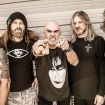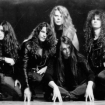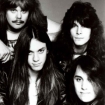Revolver's Crucial Classics vinyl collection features exclusive, colored variants of essentials from classic thrash acts like Exodus, Possessed, Anthrax and more. Quantities are limited so get yours before they're gone!
The mid-Eighties glory days of San Francisco's Bay Area thrash scene have come and gone, but its legacy continues to grow stronger with each passing decade. Thanks to the contributions from its venerated list of alumni — Metallica, Testament, Exodus, Possessed, Megadeth, to name just a few — the movement is now regarded as one of the most significant eras in American metal history.
Phil Demmel — then a high-school age guitarist growing up outside of Oakland, California — had a front-row seat for the birth of this impactful scene. While metal fans will certainly know Demmel from his 16 years with Machine Head (2002 – 2018), it was his period with Vio-lence — one of the breakout bands during the second wave of Bay Area thrash — that gave the guitarist his start as a professional musician. "There were definitely some strong swimmers in that pool back then … Just a lot of talent," says Demmel, who is currently writing and recording with a reformed (of sorts) Vio-lence.
During the second half of the Eighties, Vio-lence were among the young movers and shakers of the Bay Area scene — along with Forbidden, Heathen, Blind Illusion, Testament and Death Angel — and Demmel was smack-dab in the middle of all the good, friendly and violent fun at clubs like Ruthie's Inn, the Keystone and the Kabuki Theatre. "There really wasn't anything else like it in America at the time, and it was just the most special era in heavy music," says the guitarist. "And it'll never happen again."
Revolver recently caught up with Demmel to get his first-hand account of those early mayhem-filled days: from Exodus' "kill posers" stunts and discovering slam dancing at Slayer shows to the Forbidden feud that started when Vio-lence poached Robb Flynn …
DO YOU REMEMBER HOW YOU FIRST BECAME EXPOSED TO THE BAY AREA METAL SCENE?
PHIL DEMMEL I grew up and still live in Dublin, California, which is about 15 miles east of Oakland. Our town has certainly seen some legends come out of it — Chuck Billy is from here, Zet [Steve "Zetro" Souza] from Exodus is from here, my cousin, Troy Luccketta, who plays drums for Tesla, grew up in Dublin. So we had these older people who we could look up to who kind of brought us into the scene and exposed us to the clubs in and around San Francisco. I joined a band called Death Penalty in June 1985, my last month of high school, and we changed our name to Vio-lence. We played a free keg party here in Dublin at our buddy Paul's house, and that was our first gig.
Zet had just joined Legacy [which changed its name to Testament in early 1987] at the time, and Legacy was getting big in the East Bay and playing all the clubs, opening for bands like Lååz Rockit and Exodus or Slayer whenever they came through town. So we were seeing all this action happening at all these clubs and seeing things like slam dancing for the first time.
WHICH LOCAL BANDS WOULD YOU SAY WERE THE MODELS FOR VIO-LENCE?
Exodus for one, and definitely Legacy on a smaller, more achievable scale. Also Slayer, who were pretty much the reason I started playing heavy music in the first place. Seeing Slayer at their first Northern California appearance in 1984 and watching everything that was happening around them at the time, that's what I wanted Vio-lence to be.
THE BAY AREA CLUB SCENE WAS UNDENIABLY THE MOST ACTIVE AND VIBRANT METAL SCENE IN THE U.S. DURING THE MID EIGHTIES.
You could go to shows five nights a week if you wanted — there was always someone playing at Ruthie's Inn or the Stone or the Omni or the Keystone Berkeley. But it was all super-fucking-cool because it was basically spread across the whole Bay Area. You could go to Oakland or Berkeley or go across the bridge to San Francisco or down to San Jose, and bands would come to the area and play in a few different towns, and people would travel around the Bay and see the same band in different cities and meet new people and all that.
WHICH BANDS WOULD YOU SAY WERE THE KINGS OF THE CLUB SCENE AT THAT TIME — THE ONES EVERYONE HAD TO GO SEE WHEN THEY PLAYED?
Exodus. If Exodus was playing, you went — because it was probably some rad bill anyway, like Exodus, Possessed and Megadeth or Slayer, Exodus and Megadeth or whatever. Exodus was really the king of the local scene — but for me personally, it was Slayer. If Slayer was coming, and they played up here quite a bit, I had to go see them.
HOW WOULD YOU DESCRIBE THE CLASSIC BAY AREA METAL SOUND?
I think it all stems from Exodus. Just really raw guitars and really aggressive, but not too aggressive — it's almost like chaos in a bottle. And I don't want to describe it as a treble-based sound, but maybe it was a bit — the energy level was hyper, almost to the point of annoying. Bay Area thrash was more like a high-performance demolition derby car than a Formula One racecar. [Laughs]
IT WASN'T ONLY ABOUT THE MUSIC BACK THEN — YOU HAD TO LOOK THE PART TOO IF YOU WERE IN AN UNDERGROUND THRASH BAND. THRASH METAL FASHION WAS THE COUNTERPUNCH TO THE HAIR-METAL AND GLAM MOVEMENTS THAT WERE HUGE AT THE TIME.
Yeah, it was almost as important as the music. You had to have the right vest or the right shirt or the right jacket, and there were certain things that you just didn't wear. [Original Exodus vocalist] Paul Baloff was known for cutting T-shirts off of people and making bracelets out of them and wearing them like a badge of honor. If he saw someone wearing a Ratt T-shirt he'd cut it off and be like, "I took this poser's shirt, hahaha." That was the thing back then: "kill posers." That was Baloff's whole deal.
THERE WAS A FIERCE SENSE OF COMPETITIVENESS BETWEEN BAY AREA THRASH BANDS IN THE MID EIGHTIES.
Watching what all the other bands were always doing definitely helped create a healthy competition between all of us — it drove us and helped everyone keep pushing each other and raising the bar. Before us were bands like Exodus and then Death Angel and Testament, and watching what they were doing was what was driving us in a way. Like, "Wow, look what these guys are doing." And in our 20-year-old heads we were like, "We're better than those guys! We should be doing this!" [Laughs]
But it wasn't always nice. Vio-lence had beef with Death Angel at one point — and it was bad. Forbidden too. We would see the Forbidden guys and smile and bump fists and all that, but then we were like, "Fuck those guys — we're better than them!" Especially when Robb [Flynn] joined Vio-lence. Robb was still with Forbidden when they were called Forbidden Evil, and he wrote a bunch of stuff that ended up on that first Forbidden album, Forbidden Evil. Not many people know this, but for a while we tried to take the music to Forbidden's "Chalice of Blood" and write new lyrics for it because Robb was the one who wrote the music for that song. We were like, "That's your song, dude, so we should do it in Vio-lence." Sean [Killian, Vio-lence vocalist] wrote lyrics to go over the music, but we didn't end up recording it that way because we knew it wasn't really working, so those lyrics became "Calling in the Coroner," which appeared on our first album. But that's how petty we were back then — like, " 'Chalice of Blood' is your song, Robb, so now it should be our song!"
It got so bad with Forbidden that we used to argue over just about anything — even football. [Laughs] I remember [Forbidden guitarist] Craig Locicero and I almost coming to blows at a party because he's a big 49ers fan and I'm a big Raiders fan. Had we been talking about music we probably would have dropped the gloves. [Laughs] So, yeah, there was a big rivalry between us and Forbidden for sure. But a lot of that was because we all took everything personally back then.
HOW DID YOUR RELATIONSHIP WITH FORBIDDEN BEGIN, AND WHAT LED TO THE FRICTION BETWEEN THE TWO BANDS?
Vio-lence didn't have a rehearsal space, and we were friends with a band called Annihilation. They had a pretty big studio, and they allowed us to come in and set up in front of them and practice in their jam room. The studio was rad too, and everyone partied there like five nights a week. Forbidden rehearsed around the corner in a storage space where a bunch of different bands practiced. So we'd go over sometimes and watch Forbidden practice and we got to know the dudes — around '85 or '86 we played some shows together, that kind of thing. At the time we were definitely noticing how good their guitar player Robb was.
We were having some trouble with our other guitar player, Troy Fua, and we were getting close to signing a record deal so we were hoping to get someone in the band to help write songs. Once we persuaded Robb to join our band, it created a pretty sizable rift between us and Forbidden. And it took a long time to recover from that. Everything was just a competition back then — we even got Debbie Abono to manage us after she was already managing Forbidden. Debbie was always trying to keep things equal between the two bands, like if one got the cover of a magazine and the other didn't.
We got signed first. We were actually in a bidding war with Combat, and [A&R executive] Steve Sinclair had left Combat by then to start his own label, Mechanic Records, and we liked the idea of going with him and his label and having the major distribution of MCA Records. Looking back, we probably should have signed with Combat because they were a metal label and they would have known what to do with a band like ours instead of trying to change what we were. Seeing Forbidden sign to Combat and watching them do a lot of touring and stuff that we weren't doing made us realize that we probably made a mistake by not going with Combat.
DID YOUR FEELINGS ABOUT FORBIDDEN CHANGE AS YOU GOT OLDER?
Well, my 20-year-old self is a lot different from the 53-year-old person that I am now. The truth is, back then I couldn't look at their music objectively because I had strong personal feelings toward some of the Forbidden dudes. I definitely had respect for the first Forbidden album, though. The musician in me will not let me deny the musicianship in that band at the time — all those dudes can play circles around me. So even though I couldn't deny that aspect of it, with the personal feelings I had, just admitting that the songs were good was too much for 20-year-old Phil Demmel to muster.
Forbidden were recording their second album, Twisted Into Form, at the same time we were recording Oppressing the Masses, and I remember going for a ride with [Forbidden guitarist] Tim Calvert, who was my friend even before he joined Forbidden, and blasting each other's albums on his car stereo while we drove around. We definitely respected each other's music by that point. So even though we had some beef with Forbidden, it didn't take too long for me to be able to say, "Yeah, those guys are pretty fucking good."
VIO-LENCE HAS A VERY DIFFERENT LOOK AND FEEL THESE DAYS WITH FORMER OVERKILL GUITARIST BOBBY GUSTAFSON AND FORMER FEAR FACTORY BASSIST CHRISTIAN OLDE WOLBERS IN THE BAND
We definitely have a lot of spread-out flavor in this band now. We have an East Coast element because of Bobby and an L.A. thing because of Christian — and he's Belgian on top of that! Perry [Strickland, Vio-lence drummer] and Bobby have been friends for a long time — when Perry quit Vio-lence in the early Nineties, he and Bobby were planning to have a band with [former S.O.D./M.O.D. singer] Billy Milano. They've been buddies ever since. Bobby's kept his chops up over the years and has been looking to play, and Perry recommended him to us, so that was good enough for us — we just wanted Bobby to be in the band. He's super hungry and has been working very hard and we love having him in the band.
It's funny because a lot of people were suggesting all these local guitarists that we've known for years, but we didn't want one of these guys who plays in every Bay Area band, because with those guys there's just no real identity there. It just becomes a plug-and-play type of deal. For us, it made more sense to get this legendary player from the East Coast — it made it more special that way. And Bobby's just an awesome dude who can play and write.
WHAT'S THE STATUS OF THE NEW VIO-LENCE MUSIC?
We hope to have something out [this] year. … We're gonna start slowly releasing new material soon, and it really harks back to the early Bay Area days — it's super-fast, super-aggressive and super-fun.
WHEN YOU THINK ABOUT ALL THE MUSICIANS WHO CAME OUT OF THE BAY AREA METAL SCENE IN THE EIGHTIES AND HOW MANY OF THEM HAVE MANAGED TO HAVE SUSTAINABLE CAREERS ALL THIS TIME, IT REALLY IS QUITE AMAZING.
I'm 53 years old, and still being able to do this is pretty fucking cool. I'm not the best guitar player in the world — I'm probably not even the best guitar player on my street — but the relationships that I've cultivated and nurtured over the years I think go a long way toward being able to continue working after all this time. And the Bay Area scene definitely taught me that — the idea of getting to know people and not being so confrontational when it comes to music and being a bit more open-minded. Just growing up, basically. But yes, I definitely feel very blessed to still be here.












